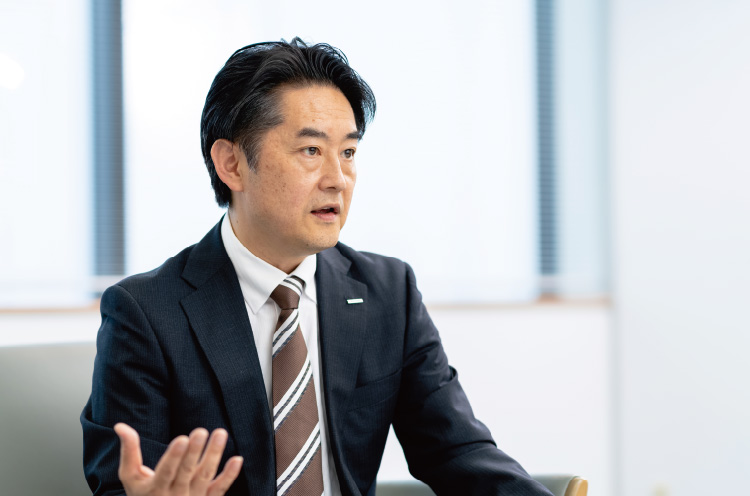Message from the CFO
Fueling Group growth with a balance of
investments and financial stability
Shinsuke TsuboiExecutive Officer, CFO
Managing Director of Finance and Accounting



Allocating funds for a balance of growth and stability
I have been focusing specifically on finance for over 20 years since 1999 when joining the Benesse Corporation Finance Department as a mid-career hire. The finance department’s role has evolved over the past two decades, but the mission to financially support businesses of high social importance such as education and long-term care has been unchanging.
At this moment, the Group’s most pressing issue is to quickly reestablish its business performance, which has suffered during the COVID-19 pandemic. The new medium-term management plan launched in April 2021 aims to generate a V-shaped recovery for profits first to regain the level of fiscal 2019 and then continue growing. The foundation for this resurgence will come from fortifying our existing businesses to generate organic growth and then to leverage our strengths to expand into new fields and build our overseas operations. At the same time, we will strengthen our financial standing, which is the foundation for growth. As director of finance, I will seek to allocate funds and generate investment return while maintaining a balance of growth investment and financial stability.
Fiscal 2020 performance review
The COVID pandemic disrupted our business activities and forced us to revise our growth plans for all of our business segments. Shinkenzemi business increased while schools were closed under the state of emergency conditions. However, all of our businesses that rely on in-person business, such as the school and teacher support, classroom education, and nursing care businesses, faced extremely harsh operating conditions. The result was an overall decline in sales and a substantial reduction in profits. Despite these developments, the market needs for all of the businesses have not diminished, and we expect the high customer satisfaction for our Group’s products and services to drive earnings recovery in all businesses once the pandemic subsides.
In the Berlitz business, the structural reform during the past few years significantly lowered the breakeven point, and sales and profits were on an upward trajectory until the pandemic caused both to turn sharply downward. Sales are currently edging back upward and profitability has improved following the extensive restructuring. If the impact from the pandemic subsides, we believe the business will regain profitability in fiscal 2022. The many uncertainties make it impossible to anticipate when or how quickly earnings will recover, and we will not hesitate to implement further measures if we determine that positive profits still appear unattainable in fiscal 2022.
DX to strengthen our businesses and expand into new areas
For our current businesses, we will advance an investment strategy aimed at generating a V-shaped recovery that will drive profits to regain the fiscal 2019 level and then continue growing. A major point in the investment in our core domain of education will primarily focus on digitalizing the business. We are stepping up investment in digitalization after the growth of the Shinkenzemi business since digitalizing its teaching materials showed us that digital transformation is essential. Digitalization will bring many advantages, such as enabling us to rapidly deliver materials with enhanced interactivity and that are better tailored to customer preferences as well as facilitating the introduction of new products and services to the tablet platforms. We will also have a better ability to cross-sell products and add high value-added services. All of these will enable more efficient and effective marketing and contribute to revenue growth. We will also aggressively invest to enhance employee digital proficiency and other areas that will fortify our business foundation for growth in the medium and long term.
The Group has also been carefully selecting and concentrating its businesses over the last few years with the aim of securing the funds needed for growth. The Group sold the call center and the interpretation/translation companies, added EDUCOM and Study Hacker to the education business, and added Proto Medical Care to the nursing care business. The Group also made a substantial investment in Udemy, a major company in the adult education field in the United States. As these existing businesses grow, we plan to allocate funds to invest in new areas where we can apply the Group’s knowledge and know-how to generate business synergies as well as in developing our domestic businesses for overseas markets. Investment targets will be selected based on information gathered from the IT department and all business divisions, and the investment methods will take full consideration of our financial structure.
Improving profitability and capital efficiency
The key performance indicators we are mainly focused on are the sales growth rate, operating profit margin, and ROE, and the new medium-term management plan sets a target of ROE of 10% or higher in fiscal 2025. ROE was 1.8% in fiscal 2020, and we estimate it will rise to 3% in fiscal 2021. If we raise profit to the level we are aiming for, then we project ROE will rise to the 7% level in fiscal 2022. In fiscal 2020, we also began using ROIC internally as an indicator of our performance to give us a closer look at the profitability of each business. We will also use ROIC as a measure of M&A investment efficiency.
It’s also important to understand that ROIC varies from business to business. For example, nursing care profits are quite stable but its ROIC tends to be lower than the Shinkenzemi and school and teacher support businesses. The Group attaches great importance to the social significance of its businesses, and therefore does not evaluate business performance based solely on ROIC. Similarly, the nursing care business is primarily geared to higher income customers, so we are accordingly seeking to raise its overall capital efficiency by expanding into peripheral businesses, such as the employment matching business in addition to the operation of facilities.
Maintaining financial discipline and accumulating cash
At the end of fiscal 2020, roughly ¥150 billion of the Company’s cash and cash equivalents were customer deposits, which included roughly ¥140 billion in deposits such as advance payments in the education business and lump sum payments for long-term nursing care. Our policy is to not use these deposits for business investments or investments that carry risk. Considering the asset-side receivables of over ¥50 billion and the standard seasonal fluctuations in the balance of deposits, we have designated up to ¥50 billion as standby funds for risk investment. Our capital expenditure is currently roughly equivalent to depreciation, but is rising as we make progress with our digital transformation. We believe that carefully managing capital expenditure and investment efficiency are essential to stable business operations.
From this point, our next step is to continue increasing operating income to raise free cash flow and to use those funds to invest in digitalization and business development while considering the funds needed to operate the existing businesses. We will also expand free cash flow and fortify our financial foundation by being scrupulous about the investment return from capital investments and M&A moves and by further strengthening our financial strategy.
To our shareholders
Our basic policy for distributing dividends to shareholders is to increase the dividend payment amount by expanding profits and to maintain a payout ratio of 35% or higher while retaining sufficient internal reserves for future growth. With this policy in mind, we maintained the stable dividend in fiscal 2020 by providing a dividend payment of ¥50 per share for the year. We look forward to your continuing support for the Benesse Group.
Last updated : 2021/11/09
- TOP
- Investor Relations
- Integrated Report
- Benesse Integrated Report 2021
- Message from the COO